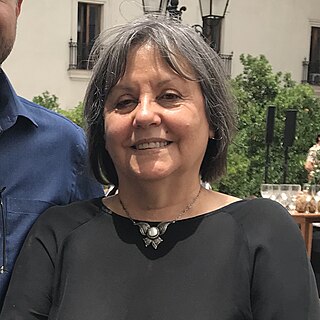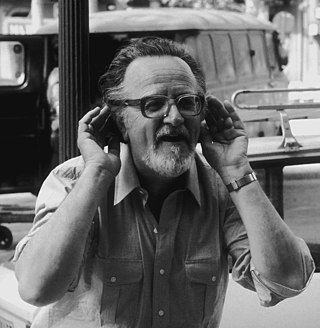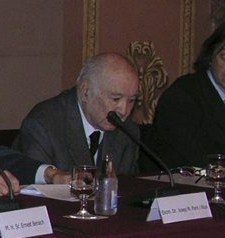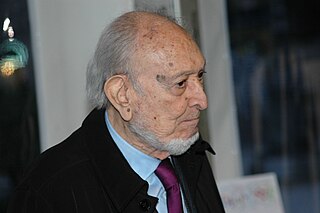
Camilo José Cela y Trulock, 1st Marquess of Iria Flavia was a Spanish novelist, poet, story writer and essayist associated with the Generation of '36 movement.

Juan Goytisolo Gay was a Spanish poet, essayist, and novelist. He lived in Marrakesh from 1997 until his death in 2017. He was considered Spain's greatest living writer at the beginning of the 21st century, yet he had lived abroad since the 1950s. On 24 November 2014 he was awarded the Cervantes Prize, the most prestigious literary award in the Spanish-speaking world.

Manuel Vázquez Montalbán was a prolific Spanish writer from Barcelona: journalist, novelist, poet, essayist, anthologue, prologist, humorist, critic and political prisoner as well as a gastronome and an FC Barcelona supporter.
Ángel González Muñiz was a major Spanish poet of the twentieth century.

Jorge Semprún Maura was a Spanish writer and politician who lived in France most of his life and wrote primarily in French. From 1953 to 1962, during the dictatorship of Francisco Franco, Semprún lived clandestinely in Spain working as an organizer for the exiled Communist Party of Spain, but was expelled from the party in 1964. After the death of Franco and the change to a democratic government, he served as Minister of Culture in Spain's socialist government from 1988 to 1991.

Alonso Cueto Caballero is a Peruvian author, university professor and newspaper columnist.

José María Merino is a Spanish novelist born in A Coruña, Galicia on 5 March 1941. He is the father of two daughters, María and Ana, both of them university professors. He lived for several years in León and currently lives in Madrid. Best known for his novels and short stories, he is also a poet and a travel writer.

Diamela Eltit is a Chilean writer and university professor. She is a recipient of the National Prize for Literature.

José Manuel Donoso Yáñez, known as José Donoso, was a Chilean writer, journalist and professor. He lived most of his life in Chile, although he spent many years in self-imposed exile in Mexico, the United States and Spain. Although he had left his country in the sixties for personal reasons, after 1973 he said his exile was also a form of protest against the dictatorship of Augusto Pinochet. He returned to Chile in 1981 and lived there until his death.
Emecé Editores is an Argentine publishing house, a subsidiary of Grupo Planeta. Its catalogue contains books on history, politics, economics, art, religion, anthropology, biography, memoirs, children's literature, humor, cooking, popular science, self-help and popular psychology, and the complete works of various authors.

Juan Gelman was an Argentine poet. He published more than twenty books of poetry between 1956 and his death in early 2014. He was a naturalized citizen of Mexico, country where he arrived as a political exile of the Military Junta.

Enrique Vila-Matas is a Spanish author. He has authored several award-winning books that mix genres and has been branded as one of the most original and prominent writers in the Spanish language.

Martí de Riquer i Morera, 8th Count of Casa Dávalos was a Spanish literary historian and Romance philologist, a recognised international authority in the field. His writing career lasted from 1934 to 2004. He was also a nobleman and Grandee of Spain.

Rosa Regàs is a Spanish writer and novelist. She is a recipient of the Premio Planeta de Novela and the Premio Nadal.

Planeta Corporación, S.R.L., doing business as Grupo Planeta, is a Spanish mass media conglomerate operating in Spain, Portugal, France and Latin America.
The Prix Formentor is an international literary award given between 1961 and 1967, and, after a long break, from 2011. In the 1960s, the Formentor Group offered two prizes, the Prix Formentor and the Prix International ; the former was given to previously unpublished works and the Prix International was given to works already in distribution. The prize takes its name from the town of Formentor on the Spanish island of Mallorca that was famous for its literary gatherings.

Josep Maria Castellet Díaz de Cossío, also known as José María Castellet, was a Spanish Catalan writer, poet, literacy critic, publisher and editor.
The Premio Biblioteca Breve is a literary award given annually by the publisher Seix Barral to an unpublished novel in the Spanish language. Its prize is €30,000 and publication of the winning work. It is delivered in February, to a work from the preceding year.
Montserrat Sabater Bacigalupi was a Spanish publisher.

Miquel Costa i Llobera, was a Spanish poet from Majorca, who mainly wrote in Catalan language. He is regarded as a prominent figure of Catalan poetry.














